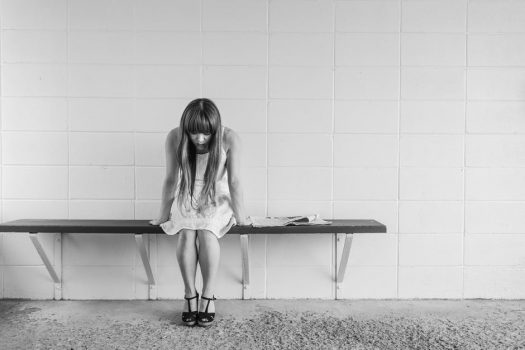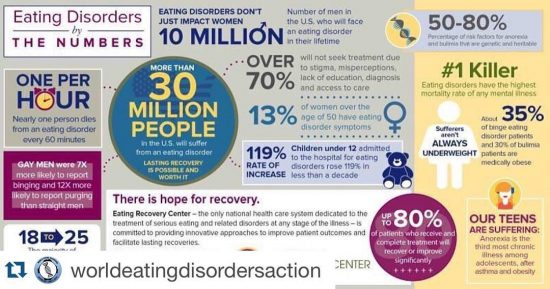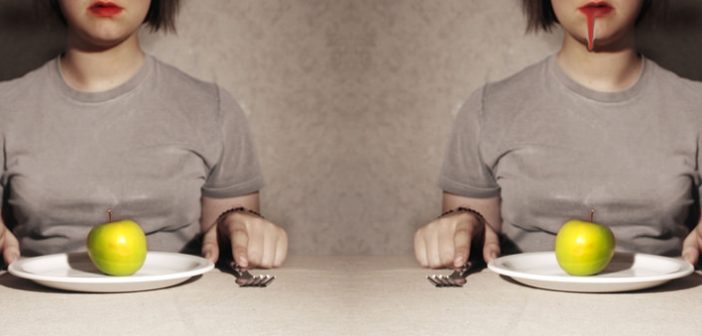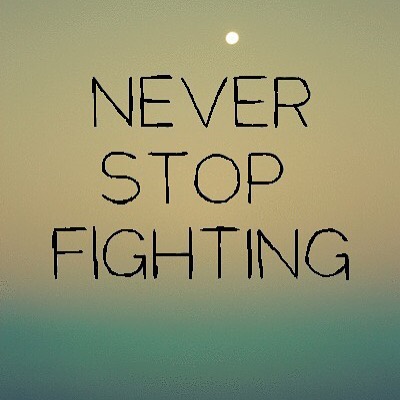Expanding the Conversation During National Eating Disorder Awareness Week
When I was twelve years old, I was diagnosed with Anorexia Nervosa. Soon my diagnosis included Bulimia and, much later, EDNOS: Eating Disorder Not Otherwise Specified. These diagnoses became an inevitable identity for me. My eating disorder became the only thing that ever mattered to me for over a decade; the only way I measured my self-worth.
In 2012, at the age of twenty, I decided to go to treatment for what I hoped to be the last time, on my own terms. I now consider myself to have officially been in recovery for five years, but it wasn’t until this past year that I got to a place where my good days far outweighed my bad days.
Overall, the general discussion about eating disorders is filled with misconceptions and misinformation. Although the topic has been given more of a spotlight in recent years, we still have a long way to go. Eating disorders are the least funded of any mental disorder and yet hold the highest mortality rate. Over 20 million women and 10 million men in the U.S. suffer from an eating disorder, and that’s just what has been reported. Not only is treatment highly expensive, it is inaccessible to most and the quality of care vastly varies depending on where you go; mostly due to inconsistent and inadequate education and training of mental health professionals.
Every year, NEDA, The National Eating Disorder Association, holds an Eating Disorder Awareness Week from February 26th-March 4th. This years theme is “It’s Time to Talk About It,” and I couldn’t agree more. People have been talking about it, but there’s a crucial part of the conversation missing, and one I would have really liked to hear when I first went into treatment. Not enough people speak out about what recovery from an eating disorder is actually like, and even fewer know what that means.
The influence of society cannot be stated enough when it comes to the formation of, and the struggle with, eating disorders. It’s just as important, if not more, that people are aware of what being in recovery really looks like.

After living twelve years of my life with an eating disorder, these are some of the things I’ve learned while in recovery:
-
Although I thoroughly enjoy food now, I will never not stress about it.
Sometimes my anxiety over what I ate, or what I am going to eat, is only a fleeting thought. Sometimes it lasts for hours. Sometimes I go to sleep tossing and turning over that piece of pizza I had on the walk home from Wildcat Lounge or the fact that I chose a sandwich over a salad for lunch. Most days I make it through unscathed, but often I still find myself working out with the intention of punishing myself, or attributing a bad mood to the fact that I had the audacity to eat dessert that week, or skip a run. None of this compares to the world I lived in when I was fully immersed in my eating disorder. But with the more time that goes by, the more I realize that recovery doesn’t mean food will never be an issue; it just means that the good days outweigh the bad, and I can actually enjoy what I eat without wanting to kill myself. Trust me when I say I never imagined I would be able to get to this point.
-
Anytime life gets hectic and my stress level rises, my first reaction will be to turn to my eating disorder.
I constantly have to be mindful of how I choose to deal with the daily stressors of life. A break up, finals week, moving, god forbid someone dying, any big changes that are out of my control will probably always be a trigger for my eating disorder. I am constantly shocked at how after all of these years, it still sneaks in and threatens to take over at a moment’s notice. At first, the temptation to relapse is subtle and the return to old habits barely noticeable, but it takes over fast and in almost no time you can find yourself completely back in your eating disorder. Vigilant mindfulness is key for me.
-
The hardest part of recovery comes after you leave treatment.
Most people think that in order to recover, all you have to do is go to treatment and then once you’re discharged, you can now get over it. For me, and most of the people I know, this couldn’t be further from the truth. Treatment is hard as hell, but what’s even harder is maintaining recovery and surviving in a world that made you sick in the first place. In treatment, your outside world is perfectly controlled. All you have to deal with are your own issues. Once you’re back in the world, nothing is in your control and as stated before, there will be countless hardships that will test your recovery and sometimes it will feel impossible to do this. On top of that, most people in your community will harbor the belief that treatment has cured you, making it harder to ask for help or to be understood when you sometimes still struggle, even years later. It can make you feel like there’s something wrong with you, or that you’re not actually “doing” recovery.
-
What you look like has very little to do with how well you’re doing.
I’ve been on every end of the spectrum, weight wise. Although the times when I was deathly skinny, I was certainly very sick, the times when my weight was completely normal were just as bad, if not sometimes worse. The longer my eating disorder persisted, the more true this became for me. Maintaining my skinniest weight became impossible as I got older, despite my habits becoming far more dangerous and intense. The last time I went to treatment I felt I was “too fat” to deserve help, but I also felt that way when I was hospitalized at a far lower weight years prior. There will never be a magic number where you feel skinny enough, or deserving of treatment. But it becomes very dangerous when the general public is taught that people with eating disorders are skeletons. It teaches people not to notice their struggling loved ones, and it makes it really hard to decipher if someone in recovery is doing okay or not. It’s also completely invalidating to the thousands of individuals struggling with eating disorders that aren’t anorexia nervosa. Many bulimics maintain a completely normal weight, and people with binge eating disorder are often overweight. Overall, the sooner we can stop associating someone’s body size with their mental and physical health, the better off we will all be.
-
The problems that existed when you got sick, will still exist after you get help.
I’ve come to the understanding that my eating disorder was very much a coping mechanism for various problems in my life, and problems within myself. I thought that food and my body were all that mattered when I was sick. After I got help, I noticed that all of these other very real issues still existed and would have to be dealt with if I ever wanted to be “okay.” Perfectionist tendencies, a strong need for control, high anxiety- these are all common traits in people with eating disorders that will cause problems in recovery. An eating disorder is a symptom of a larger problem, and that problem will have to be addressed if you want to maintain recovery and stay healthy.
-
You might never learn to love your body and that’s okay.
When I went to treatment, many therapists said the last thing to go is disordered body image. That might be true, but I think it’s equally true that you may never love your body like you pictured. That being said, hopefully you learn to stop actively hating it, but you might not wake up everyday, stand naked in front of the mirror and think, “I love my body.” I’ve had times where I felt truly confident in a bikini, and could post pictures on Instagram and forget about it. But I still have months, weeks, days, where I need to sit and cry in my room, not wanting to leave the house because nothing I tried on looked okay to me. The difference now is that I still leave the house, and eventually I forget about it. My attitude toward my body definitely still impacts my mood, but it doesn’t control it or dictate what activities I’ll engage in anymore, and to me that’s what recovery looks like. It doesn’t mean you have to be body positive and convinced that every part of you is amazing. It just means you can appreciate what your body is doing for you, and maybe not punish it every time you feel like your stomach is too jiggly or your legs are too big.
-
It’s impossible to ignore the role that society will play in your recovery.
Once you’ve gotten help, you realize just how many things around you are totally triggering and messed up. As a society, we have a very disordered relationship towards food and body image. We encourage crash diets, dramatic cleanses, plastic surgery, and idolize beauty above any other accomplishment; especially for women. When you’re going through recovery, literally everything on your phone or that you read becomes like navigating a minefield. You have to find a way to tune out, and to change the conversation in your own circle. It’s insane how many of us spend our time talking about what we hate about our bodies, how much weight we want to lose, how many calories are in an almond, what new diet we’re doing, and this is toxic. But engaging in this kind of conversation, and people who hold these values, becomes a choice you have to make. I personally use this as a deal breaker for the kind of people I keep around in my life. I know now that I will never be able to jump on the latest fad diet and that’s so okay with me. I no longer feel this immense pressure because the relationships I’ve built and the shift in values for me far outweighs my old ability and desire to fit in with the status quo.
-
Not talking about it will keep you sick.
You certainly don’t need to write a public article like this, or hang a billboard saying “I have an eating disorder,” but in my experience eating disorders breed and thrive in secrecy. The more shame I felt over having an eating disorder, the more I built it up to be this deep, dark thing, the more alienated I was from my peers and the stronger the eating disorder became. It’s still scary to talk about, and it’s definitely hard to navigate into the conversation after I get close to someone new or am dating someone for awhile. But the more I am able to talk about it, the more I realize that people actually can understand, and relate. Eating disorders are far more common than most of us realize, and the underlying themes are ones that most people can relate to; whether their sick or not. Connecting with others, and letting people in has been the hardest thing about my recovery and it has been the most important piece.
Ultimately, recovery from an eating disorder is complicated, difficult and a lot of work. People often fall into two camps, saying that complete and total recovery is possible if you just work hard enough or that eating disorders are a disease that will stay with you your entire life, like addiction, and you’ll constantly have to work at it. For me, I think it falls somewhere in between. In my experience, recovery has taken a constant vigilance, but every year I see it get easier and easier overall. I think that if you’re willing to do the personal work, that will be immensely helpful, but the key is to make sure that you’ve changed your circumstances, and you make sure you are always living a life that is true to you, and in relationships that are fulfilling and healthy. I notice that the only times now I’m really in danger of relapsing are because I’ve found myself stuck in a job, lifestyle or person that is toxic. Recovery is about progress, not an ultimate destination, and it will look like something else to everyone. The important thing is what it means to you, only you can know if this is what makes you happy and healthy.
For more information on eating disorders:
If you’re struggling, or know someone who is, you can find resources here:
http://nedawareness.org/get-help





